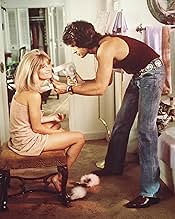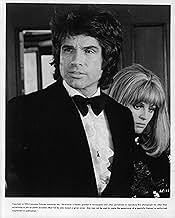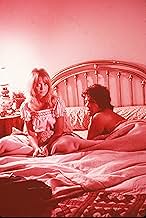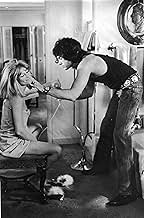Aggiungi una trama nella tua linguaOn Election Day, 1968, irresponsible hairdresser and ladies' man George Roundy is too busy cutting hair and dealing with his girlfriends and mistress Felicia Karpf, whose husband Lester is h... Leggi tuttoOn Election Day, 1968, irresponsible hairdresser and ladies' man George Roundy is too busy cutting hair and dealing with his girlfriends and mistress Felicia Karpf, whose husband Lester is having an affair with his ex-girlfriend Jackie.On Election Day, 1968, irresponsible hairdresser and ladies' man George Roundy is too busy cutting hair and dealing with his girlfriends and mistress Felicia Karpf, whose husband Lester is having an affair with his ex-girlfriend Jackie.
- Vincitore di 1 Oscar
- 3 vittorie e 11 candidature totali
Recensioni in evidenza
The great joke of the film is that George exists solely to please other people. He's entirely selfless. Whilst Ashby paints the rest of society as being self-centered and selfish, George dutifully cuts hair, tends to women and bounces from one lover to another. The poster boy for altruism, he exists solely to make other people happy.
Though marketed as a sex comedy, the film works better as a political statement. It takes place during the eve of the 1968 presidential election (in which Nixon was elected) and attempts to capture the last vestiges of a certain crazy, carefree era, Ashby contrasting whimsical Pre-Nixon attitudes (nonchalant sex, free love, a kind of social cohesion which George can no longer maintain), with the knowledge that Watergate, corruption, lies and the general pessimism of the Nixon era, were all on the horizon. By the film's end, George can no longer love everybody. The glue has failed and myopia, separation, selfishness and egotism on a grand scale has begun.
Unsurprisingly, everyone in "Shampoo" aspires to success in both bed and bank. The characters are constantly working. Working at their jobs, on themselves, or on their lovers etc. But Ashby's larger point is that they ultimately have no significant political or cultural impact. They're too selfish, myopic and self centred, and thus the Nixon administration, which comes about at the end of the film, is exactly what these people deserved.
"Shampoo's" opening and closing scenes neatly portray George's own personal evolution. The film opens with him making love to one of his many women, the Beach Boys' lyrics, "Wouldn't it be nice if we were married..." pulsating on the soundtrack. The song emphasises the yearning beneath George's playboy image. By the end of the film, however, George is left alone on a hill top, watching as his women turn their backs on him and drive away with their respective partners. They've all moved on, whilst he stands there, a dead man with a pipe dream. Hard luck, man.
7.9/10 - Worth one viewing. Adam Sandler's "Don't Mess With The Zohan" would borrow heavily from Warren Beatty's work here.
Lee Grant won an Oscar for playing Lester's bored wife who can't seem to take her eyes off Beatty, and even her nymphet daughter (a young Carrie Fisher) desperately wanted him to be engaging in reciprocal sex Grant's actually quite jovial and adorable in her role as we heartily feel for her character near the climax
Warren Beatty appears either excitable or distracted through most of the story He lies, hides, and denies facts, doing whatever it takes to make everyone happy...
If you like to see Julie Christie notoriously fellating Beatty underneath an elegant dinner table well don't miss this funny sex comedy which received four Oscar nominations
Shampoo is a sex comedy in that most, if not all, of its jokes revolve around sex, or at least the implication that sex has taken place or might be about to take place. As a result it is arguable that the comedy is a bit thin and repetitive, and it is true that the story is hardly bursting with riotous wit. And yet ace screenwriter Robert Towne constructs situations that are funny in their believable social awkwardness. They might only raise a chuckle or two over the course of a scene, but they have an almost soap opera quality which keeps us watching. Besides, there's a bit more going on here than bedroom humour. The decision to set it seven years in the past seems strangely arbitrary at first, but it has a surprisingly moving impact when political events start to creep into the narrative, and Warren Beatty's womanising antics are put into some perspective.
Like all comedies, a lot of its success or otherwise depends on the acting performances. This was largely an age of realism in acting, but here the performances are just on the comedic side of real. Nobody does anything which is exactly funny in its own right, but it often is funny in its timing and context. For example, there is Beatty's mumbled excuse to Carrie Fisher (whom he has just had sex with) when he is dragged off by Lee Grant (who intends to have sex with him). Similarly, a lot of Jack Warden's self-important manliness is funny in the context of the fact that Beatty is busy screwing his wife, mistress and teenage daughter. Lee Grant gives another of her typically attention-grabbing minor roles, the authoritative society lady one minute, girlishly sipping a soft drink through a straw the next. Returning to Beatty, I'm also vaguely amused by the way he emphasises the last syllable in "pancreas" during the first scene, as if it's some kind of ass.
The director here is Hal Ashby, a really fine craftsman of 70s cinema with a deceptively simple approach. He doesn't move the camera much, and often keeps back a bit from the action, not in a cold, distant way but more to show everything that is going on in a scene and allow the actors' body language to come across as well as facial expression. This is even effective for the comedy, such as in the scene where Beatty trashes the bin outside the bank, in which the wide shot makes him look somewhat pathetic in his anger. When Ashby does move the camera it is usually to give an impression a setting or situation, often with beautiful economy, and nearly always disguised by following the movement of a character. Take the shot which introduces Jack Warden's home life. He enters from one end of the room, kisses his daughter in mid-shot and surrounded by lots of colour. Then as he crosses what turns out to be a rather large room, the camera wheels round, to reveal his wife sitting alone amid stark white furnishings. An editor before he took up directing, Ashby clearly knows the potentially comedic value of a well-timed crosscut. For example, after the scene in which Warden discusses whether or not Beatty is "a fairy", we cut to a shot of Beatty blow-drying a woman's hair, her face virtually in his crotch.
But there is one thing that makes Shampoo really stand out, and this is something which comes both from Ashby's direction and the Towne/Beatty screenplay: Despite coming from a more liberated era, it still has the artful good taste of the sex comedies of the 30s. It resists the temptation to become soft porn or a string of gross-out jokes. There is only a little partial nudity, and for the most part we do not see much of the sex acts, only their beginnings and aftermaths. And this is an era in which a fairly graphic sex scene was fast becoming a staple of any romantic movie. Despite its being a comedy almost wholly concerned with one man's sexual adventures, Shampoo is a surprisingly mature and refreshingly intelligent motion picture.
Yet, I cannot blame this film for what it does well, which is portray the life of a man who simply wants a good time and success and an accurate picture of the times of 1968 when Nixon was about to be elected, the Summer of Love was almost upon us and free love was a progressive idea. Yet, this movie seems harder on these characters than would be let on. Perhaps it is a nostalgic look-back to a time when there was a great feeling of new-found freedom but these people didn't know what to do with it. Some also criticize it for being chauvinistic but in reality, the females are the most confident, the most aware of their situations and the only ones able to make sense of what the next step should be.
As you might expect, the acting is very good with Beatty playing the character completely aloof, always in his own world trying to think faster than the situations being thrown at him. He realizes what a mess he's in but also knows he doesn't want out so easy. Goldie Hawn is a wonderful, charming and confident actress whose beauty is secondary to her talent while Julie Christie gives the film's best performance as a conflicted woman who seems to know exactly what she will do despite not letting on. The Academy Awards only recognized Lee Grant and Jack Warden, perhaps because they represent a past age, a world about to get completely swept up in the new era being established during the '60s.
Some see it as a political satire, others see it as an unfunny comedy about the consequences of free love. I see it as both as well as a very smart character study of what not to do but also why it's so fun doing it.
Lo sapevi?
- QuizLovers off and on since 1967, Warren Beatty and Julie Christie broke up for good during the making of this movie. They remained friends and later worked together in Il paradiso può attendere (1978).
- BlooperThe Coca-Cola can George drinks from while chatting with Lorna is a post-1968 design.
- Citazioni
George Roundy: Can't we just, eh, be friends?
Lorna: Okay.
[teen-aged Lorna makes George an offer he can't refuse]
Lorna: You wanna fuck?
- Curiosità sui creditiIn the opening credits, horror film producer/actor William Castle is billed as "Bill Castle," but in the end credits he is back to "William Castle."
- ConnessioniFeatured in Precious Images (1986)
- Colonne sonoreWouldn't It Be Nice
(1966) (uncredited)
Music by Brian Wilson
Lyrics by Tony Asher, Mike Love and Brian Wilson
Performed by The Beach Boys
I più visti
- How long is Shampoo?Powered by Alexa
Dettagli
- Data di uscita
- Paese di origine
- Lingua
- Celebre anche come
- Sosyete kuaförü
- Luoghi delle riprese
- 2270 Bowmont Drive, Beverly Hills, California, Stati Uniti(Jackie's House at Bowmont & Hazen)
- Aziende produttrici
- Vedi altri crediti dell’azienda su IMDbPro
Botteghino
- Budget
- 4.000.000 USD (previsto)
- Lordo Stati Uniti e Canada
- 49.407.734 USD
- Lordo in tutto il mondo
- 49.407.734 USD
Contribuisci a questa pagina


































